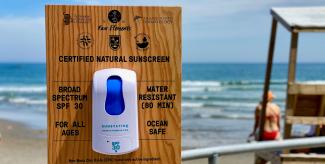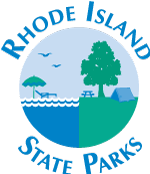Touch-Free Sunscreen Stations
This program is no longer active
Funding for the complimentary sunscreen has ended. Remaining sunscreen will be offered at State beaches during the 2024 beach season until supplies are exhausted. Sun safety remains a priority in Rhode Island. The Rhode Island Department of Health's Comprehensive Cancer Control Program has worked diligently with state and local parks and recreation partners to raise awareness of sun-safe behaviors among outdoor workers, beach-goers, and recreational athletes. Visit the RI Department of Health's website for recommendations to keep yourself and your family safe when spending time in the sun. Talk to your provider about getting your annual skin cancer screening.

Rhode Island was the first State to offer statewide complimentary natural sunscreen stations
In a leading effort to protect its residents from skin cancer, the Ocean State provided public natural sunscreen dispensers at all state beaches and parks during the summer. Launched in 2019 and seeing over 75,000 uses throughout the summer season, Rhode Island's statewide initiative of offering complimentary, environmentally safe sunscreen dispenser stations at all State Beaches and Parks ran through the 2023 summer season.
These efforts are brought to Rhode Island State Parks by RI Governor and US Senator Jack Reed, Rhode Island Department of Health, Rhode Island Department of Environmental Management, The Partnership to Reduce Cancer in Rhode Island, Rhode Island-based South County Dermatology and Raw Elements USA®, a certified natural sunscreen company founded by a long time Rhode Island lifeguard. The complimentary sunscreen initiative was funded by the Rhode Island Department of Health and the Partnership to Reduce Cancer in Rhode Island through a federal Comprehensive Cancer Control cooperative agreement from the U.S. Centers for Disease Prevention and Control (NU58DP006291-03-00), as well as by investment from South County Dermatology and Raw Elements.
Overexposure to the sun is the leading cause of skin cancer, the most common form of cancer in the U.S. By making natural sunscreen readily available throughout the state, the Ocean State helped its millions of sun-seeking residents and visitors take the first step in reducing their risk of developing skin cancer while educating on the harmful effects of chemical sunscreen on the ocean and its marine life.
